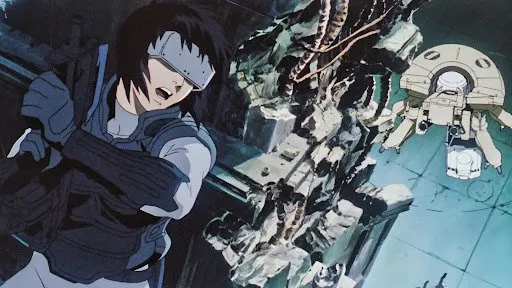
El Fantasma en la Armadura |
How are you sure that you are you?
Welcome to this new post. In this opportunity I have the pleasure to talk to you about one of the animated films that I liked the most, entitled " " Ghost in the Shell ", and I'm not referring to the latest film adaptation whose main role is performed by the beauty of Scarlet Johanson, but to the original " film " presented in anime format.
This film is one of the most deeply I've seen qun touches the theme of cyberpunk (except " Blade Runner "), so you will see issues closely related to what is the identity, the sense of "being human " and the transcendence of the body in time.
I hope you enjoy it and I recommend it 100%.
¿Cómo estás seguro de que tu eres tu?
Bienvenidos a este nuevo post. En esta oportunidad tengo el placer de hablarles acerca de una de las películas de animación que más me ha gustado, titulada " Ghost in the Shell " interpretada al español como " El Fantasma en la Armadura ", y no me refiero a la última adaptación al cine cuyo papel principal es realizado por la belleza de Scarlet Johanson, sino a la película " original " presentada en formato anime.
Esta película es una de las que más profundamente he visto qun toca el tema del cyberpunk (exceptuando a " Blade Runner "), por lo que se van a ver temas muy relacionados a lo que es la identidad, el sentido de "ser humano" y a la trascendencia del cuerpo en el tiempo.
Espero lo disfruten y la recomiendo al 100%.

Sinopsys
You are a policewoman in a densely populated, polluted and technologically super developed city, where it is not enough just to catch the being before you committing a crime, but you must investigate anything as simple as it may seem to get to the truth, where the days seem endless and where even time loses its identity.

That would be a poetic description of the case, but it is about a cyborg policewoman named Motoko Kusanagi whose only human parts are her brain and spine, who belongs to section 9 known as the computer crimes unit; it should be noted that the world in which the story takes place is in the year 2029 and in a world that has just come out of the 3rd nuclear world war, after which Japan became a superpower and is the target of several computer crimes.
The story tells the performance of this section 9 in its race to catch a computer criminal called " puppet master ", who manages to hack cyborgs, use them to do their misdeeds and leave no trace, as those affected literally forget what happened. I am obliged to say that this description I am giving is very precarious in childishness compared to what actually happens in the movie, the plot-twists are masterful and I can bet you that you will have no idea what the ending of the movie is.
Sinopsis
Eres una policía en una ciudad densamente poblada, contaminada y tecnológicamente súper desarrollada, donde no basta solo atrapar al ser que esta ante ti cometiendo un crimen, sino que debes investigar cualquier cosa por más sencilla que parezca para llegar a la verdad, donde los días parecen inacabables y donde hasta el tiempo pierde su identidad.

Esa sería una poética descripción del caso, pero se trata de una ciborg policía llamada Motoko Kusanagi de lo que solo tiene de humano el cerebro y la espina dorsal, que pertenece a la sección 9 conocida como la unidad de crímenes informáticos; cabe destacar que el mundo en el que se desarrolla la historia es en el año 2029 y en un mundo que acaba de salir de la 3era guerra mundial nuclear, tras lo que Japón se volvió una superpotencia y es objeto de varios crímenes de índole informático.
La historia relata la actuación de esta sección 9 en su carera por atrapar a un delincuente informático llamado " puppet master " (el titiritero), que logra hackear a los ciborgs, utilizarlos para hacer sus fechorías y no dejar rastro, ya que los afectados literalmente olvidan lo que pasó. Estoy obligado a decir que esta descripción que estoy dando es muy precaria en infantil en comparación con lo que realmente ocurre en la película, los plot-twist son magistrales y les puedo apostar que no tendrán idea de cual es el final de la película.

Movie Analisys
- There are several very definite points that this film touches on, but the first one I will mention will be the definition of self. This is a classic topic to deal with whenever cyberpunk is involved, since in this genre the boundaries are blurred and the concepts change, putting us to reflect once again. Is a cyborg a human?, yes, indeed; since the question of humanity does not depend on the container, but on the ability to reason and its principles, birth and development, and the recognition of death. The concept of humanity is an ideal, so there are times when a human ceases to be human and where something that is not human is.

Source
I must admit that the definition of human is still very much linked to the body and the physical, and in my ignorance I don't know if it is absolutely necessary for that to be so and to remain so; perhaps if the body is excommunicated from the concept of " humanity " it can no longer remain so and should be called something else, on the other hand if these two things could be unlinked, the biological point of view will be weighted less and the ethical and moral one more, an interesting divergence in society would be born, but ignoring biology in the word " humanity " would be difficult since this is its mother, regardless of politics being its father.
If robots dream of electronic sheep, could they love cybernetically?
Curious paraphrase of Philip K. Dick's famous sentence whose interpretation is profound and too closely related to the film at its most neuralgic point. First, can robots dream?, what this sentence implies alludes to the side effect of consciousness and background processes of the brain, so it should have a great processing capacity; then, if a computer could develop that level of cognitive processes, would the same computer also be able to love?

Source
Let's not get our hopes up and analyze the facts, it is known that what we call love is a cascade of hormones and chemical compounds released into the bloodstream by a specific psychological stimulus, so for that part I highly doubt that a computer could develop love with an algorithm; there is another part of love that is a bit more mechanical, and that is what is truly considered love: Is the ability to care about another being and put their welfare before our own, and in my opinion this idea of love if more possible (at least for a computer), only that to get to that point is necessary a series of quite interesting logical premises.
How are you sure that you are you, that your reality is not fake and that your memories are not implanted? This question sounds a lot like " Matrix ", but it caught my attention because of the idea raised by the movie of " hacking " a human being with cybernetic implants, and altering his memory and acting in such a way that he is your servant and has no idea that he is; so how are you sure that what you are reading right now is not a lie created in a supercomputer and projected directly into your brain? exactly, you can't know. From that point of view the sense of identity is lost and you realize that memories are an important part of the self.

Source I must admit that I loved the weapons presented and the technological advances shown, such as the thermo-optic camouflage suit, the aforementioned and super exploited bionic prosthetics, and the production of generic weapons from custom interchangeable parts and completely illegal. There are other things like tanks and high caliber weapons that I found more eye candy than anything else, although I would love a rifle with a 5,000 meter no-drop range with anti-tank ammo.

Source A doubt, can consciousness be created artificially or is it a unique condition independent of its origin? As far as I see, everything depends on what we refer to when using the word " consciousness ", which in scenic is " to have notion of being ", so it would not matter the origin of that consciousness if it fulfills the criteria and with what that entails, so I consider that if a computer acquires notion of itself and reasons in favor of that, it is one more consciousness even if its origin is not natural or biological.
Análisis de la película
- Hay varios puntos muy definidos que toca esta película, pero el primero que mencionaré será la definición del ser. Este es un tema clásico a tratar siempre que el cyberpunk esta implicado, ya que en este género los límites se desdibujan y los conceptos cambian, poniéndonos a reflexionar una vez más. ¿Un ciborg es un humano?, si, efectivamente; ya que la cuestión de la humanidad no depende del contenedor, sino de la capacidad de razonar y de sus principios, del nacimiento y desarrollo, y del reconocimiento de la muerte. El concepto de humanidad es un ideal, por lo que existen momentos en los que un humano deja de serlo y en donde algo que no es humano lo es.

Source
Debo admitir que la definición de humano esta todavía muy ligada al cuerpo y a lo físico, y en mi ignorancia no se si sea absolutamente necesario que eso sea así y siga así; quizá si se excomulga el cuerpo del concepto de " humanidad " ya no pueda seguir siéndolo y deba llamarse de otra forma, en cambio si se pudieran desvincular estas dos cosas, se ponderará menos el punto de vista biológico y más el ético y moral, nacería una divergencia interesante en la sociedad, pero ignorar la biología en la palabra " humanidad " sería difícil ya que esta es su madre, independientemente de que la política sea su padre.
Si los robots sueñan con ovejas electrónicas, ¿podrían amar cibernéticamente?
- Curioso parafraseo de la célebre oración de Philip K. Dick cuya interpretación resulta profunda y esta demasiado relacionada con la película en su punto más neurálgico. Primero, ¿pueden los robots soñar?, lo que esta oración implica hace alusión al efecto secundario de la conciencia y los procesos en segundo plano del cerebro, por lo que a debería contar con una gran capacidad de procesamiento; entonces, si una computadora podría llegar a desarrollar ese nivel de procesos cognitivos, ¿la misma computadora también sería capaz de amar?

Source
No nos hagamos ilusiones y analicemos los hechos, es sabido que lo que llamamos amor es una cascada de hormonas y compuestos químicos liberados al torrente sanguíneo por un estímulo psicológico específico, así que por esa parte dudo mucho que una computadora pueda desarrollar amor con un algoritmo; hay otra parte del amor que es un poco más mecánica, y es lo que de verdad se considera como amor: es la capacidad de preocuparse por otro ser y anteponer su bienestar al nuestro, y en mi opinión esta idea de amor si es más posible (al menos para una computadora), solo que para llegar a ese punto es necesario una serie de premisas lógicas bastante interesantes.
- ¿Cómo estás seguro de que tu eres tu, de que tu realidad no es falsa y de que tus recuerdos no son implantados? Esta pregunta suena mucho a " Matrix ", pero me llamó la atención por la idea que plantea la película de " hackear " a un ser humano con implantes cibernéticos, y alterar su memoria y su actuar de tal manera que sea tu sirviente y no tenga ni idea de que lo es; así que ¿cómo estas seguro de que lo que estas leyendo ahora mismo no es una mentira creada en una supercomputadora y proyectada directamente en tu cerebro? exacto, no puedes saberlo. Desde ese punto de vista el sentido de identidad se pierde y te das cuenta que los recuerdos son parte importante del ser.

- Debo admitir que me encantaron las armas presentadas y los avances tecnológicos que se muestran, como el traje de camuflaje termo-optico, las ya mencionadas y súper explotadas prótesis biónicas, y la producción de armas genéricas de piezas intercambiables personalizadas y completamente ilegales. Hay otras cosas como los tanques y las armas de alto calibre de las que me pareció más vistosidad que nada, aunque me encantaría un rifle con un rango de disparo sin caída de la bala de 5.000 metros con munición anti-tanque.

- Una duda, ¿la conciencia puede ser creada artificialmente o es una condición única e independiente de su origen?. Por lo que veo, todo depende de a qué nos referimos al usar la palabra " conciencia ", que en escénica es " tener noción del ser ", por lo que no importaría el origen de esa conciencia si cumple con los criterios y con lo que eso conlleva, por lo que yo considero que si una computadora adquiere noción de si misma y razona en pro de eso, es una conciencia más aunque su origen no sea natural ni biológico.

Curiocities
This film and the initial manga marked a milestone in the cyberpunk pattern of its time, and represented the entry of Japanese culture and its art into the Western world.
Several OVAs, sequels, games and alternate histories were taken from this film, and it proposed several ideas for other film productions after this one; the digital rain seen in the " Matrix "" trilogy and the way they enter it (by connections in the neck) were obtained from " Ghost in the Shell "".

Several arguments observed in the feature film come from various Western philosophers such as Kant, Descartes, Hegel and even Schopenhauer.
The opening kinematics featuring Inspector Kusanagi's montage depicts the work of Botticelli's "Birth of Venus".
The film is not canon, but both are masterpieces in the genre. The manga focuses more on the crime and missions of Section 9, while the film is based on the existential dilemma of Inspector Kusanagi.

Curiosidades
- Esta película y los mangas iniciales marcaron un hito en la pauta del ciberpunk de su momento, y representaron la entrada de la cultura japonesa y su arte al mundo occidental.

- A esta película le sacaron varios OVAs, secuelas, juegos e historias alternativas y propuso varias ideas para otras producciones cinematográficas posteriores a esta,; la lluvia digital que se ve en la trilogía de " Matrix " y la forma en la que entran a la misma (por conexiones en el cuello) fueron obtenidas de " Ghost in the Shell ".
- Varios argumentos observados en el largometraje provienen de varios filósofos occidentales como Kant, Descartes, Hegel y hasta Schopenhauer
- La cinemática del inicio que presenta el montaje de la inspectora kusanagi representa la obra del " Nacimiento de Venus " de Botticelli.

- La película no es canon, pero ambas son obras maestras en el género. El manga ce centra más en al delincuencia y las misiones de la sección 9, mientras que la película se basa en el dilema existencial de la inspectora Kusanagi.

- Ve la película, no te defraudarás, de verdad deja mucho en lo que pensar si te gusta el género y le prestas la suficiente atención.
- Hay dos películas que puedes ver, la original y una remasterización llamada " Ghost in the Shell 2.0 ", que tiene CGI, colores más brillantes y retoques en la banda sonora.
- See the movie, you won't be disappointed, it really leaves a lot to think about if you like the genre and pay enough attention to it.
- There are two movies you can watch, the original and a remastering called " Ghost in the Shell 2.0 ", which has CGI, brighter colors and tweaks to the soundtrack.
